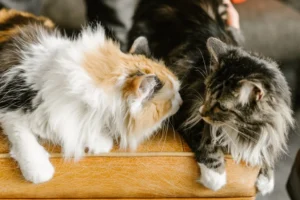Have you ever wondered why your male cat doesn’t try to mount female cats? It’s a common question among cat owners, but the answer may surprise you. In this blog post, we will explore the reasons behind this behavior and provide insights into the feline mating process.
Instinctual Behavior in Cats
When it comes to mating behavior in cats, it’s essential to understand their instinctual nature. Male cats are not always interested in mounting female cats due to several factors. One of the primary reasons is that cats are solitary animals by nature. Unlike pack animals, cats do not rely on a social hierarchy for mating purposes. This independence can lead to male cats being selective in their choice of mates, sometimes showing disinterest in mating altogether.
Additionally, male cats may not mount female cats if they are not in heat. Female cats have specific periods of fertility, known as heat cycles. During these cycles, they release pheromones that signal their readiness to mate. If a female cat is not in heat, a male cat may not show interest in mating with her, as he can sense that she is not receptive to his advances.
Another factor to consider is that some male cats may be neutered, preventing them from exhibiting mating behaviors. Neutering is a common practice to control the pet population and can also have benefits for a cat’s health and behavior. If your male cat has been neutered, it’s possible that he simply does not have the drive to mate with female cats.
In some cases, male cats may also exhibit territorial behavior that can impact their mating tendencies. Cats are known for being territorial animals, and a male cat may be more focused on defending his territory than seeking out mates. This territorial instinct can override their natural mating instincts, leading to a lack of interest in mounting female cats.
It’s essential to consider these instinctual behaviors when wondering why your male cat does not mount female cats. Understanding your cat’s natural instincts can help you better care for and support their needs. If you have further concerns about your cat’s mating behaviors, consulting with a veterinarian can provide valuable insights and guidance tailored to your cat’s specific situation.
Pro Tip: Providing a stimulating environment for your cat, complete with toys, scratching posts, and interactive play, can help satisfy their natural instincts and keep them mentally and physically stimulated.
Health and Wellbeing Factors
Your cat’s health and overall wellbeing play a crucial role in their mating behaviors. If your male cat is not showing interest in mounting female cats, it could be a sign of underlying health issues. Cats are masters at hiding illness, so subtle changes in behavior, such as a lack of interest in mating, can be an early indication that something is wrong.
One common health issue that can affect a cat’s mating behavior is stress. Cats are highly sensitive animals and can become stressed due to various factors, such as changes in their environment, conflicts with other pets, or underlying health conditions. A cat that is stressed may exhibit a range of behaviors, including a disinterest in mating. Creating a calm and stable environment for your cat, with plenty of hiding spots and areas to retreat to, can help reduce their stress levels and potentially improve their mating behaviors.
Furthermore, physical ailments such as pain or discomfort can also impact a cat’s desire to mate. Male cats may experience pain or discomfort due to conditions such as urinary tract infections, arthritis, or dental issues, which can affect their overall wellbeing and make them less inclined to mate. Regular check-ups with your veterinarian can help identify and address any health issues that may be affecting your cat’s mating behaviors.
Overall, it’s essential to prioritize your cat’s health and wellbeing when considering why they are not mounting female cats. By addressing any underlying health issues and providing a supportive environment, you can help ensure that your cat is happy, healthy, and comfortable in their own skin.
Pro Tip: Regular veterinary check-ups, a balanced diet, and plenty of mental and physical stimulation are key components of maintaining your cat’s health and wellbeing. Taking proactive steps to support your cat’s overall health can help prevent potential issues that may impact their mating behaviors.
Social Interaction and Hierarchy
Have you ever noticed your cat not showing interest in mounting female cats? Well, it might be because of social dynamics and hierarchy within a group of cats! Cats have a complex social structure where dominant cats may have priority when it comes to mating. So, if your cat is lower in the hierarchy, they might not be as inclined to mount female cats. Understanding these social dynamics can shed light on your cat’s behavior and why they may not be engaging in mating behaviors.
Neutering and Spaying Effects
Thinking about why your cat isn’t mounting female cats? Let’s talk about neutering and spaying. These procedures can significantly impact a cat’s behavior, including their interest in mating. Neutering male cats reduces their urge to mate and can make them less likely to exhibit mounting behaviors. On the other hand, spaying female cats eliminates their heat cycles, reducing the chances of your cat showing interest in female cats. So, if your cat has been neutered or spayed, that could be a major reason why they are not mounting female cats.
Additional Unique Insight:
Did you know that neutering or spaying your cat not only affects their mating behavior but also has health benefits? Neutering can reduce the risk of testicular cancer in male cats, while spaying can lower the chances of uterine infections and mammary tumors in female cats. So, besides impacting their interest in mating, these procedures can also promote your cat’s long-term health.
Territorial Instincts
Have you ever wondered why your male cat isn’t showing typical mating behaviors towards female cats? Well, it could be due to their strong territorial instincts. Male cats may not mount females if they feel their territory is threatened or if they perceive other male cats as competitors. This instinct to protect their space can override their natural mating instincts, leading to a lack of interest in mating. Providing a secure and comfortable environment for your cat can help alleviate territorial stress, encouraging more typical mating behaviors.
Understanding Cat Communication
When it comes to mating behaviors, communication plays a crucial role in cats. During mating seasons, female cats release pheromones to attract male suitors. If your cat isn’t mounting females, it could be due to a lack of proper communication or receptivity from the female. Cats use a combination of scent, body language, and vocalizations to express interest in mating. Observing your cat’s body language and interactions with females can provide valuable insights into why they may not be engaging in mating behaviors. Additionally, allowing for controlled introductions between cats and providing a calm environment can facilitate better communication and potentially lead to successful mating.
- Provide Adequate Resting Areas: Cats need ample resting spaces to feel secure and comfortable, which can help alleviate stress and encourage mating behaviors.
- Monitor Interactions: Pay attention to how your cat interacts with female cats, looking for signs of communication or interest in mating.
- Consult a Veterinarian: If your cat continues to show disinterest in mating despite creating a conducive environment, it may be beneficial to consult a veterinarian to rule out any underlying health issues that could be affecting their behavior.
By understanding your cat’s territorial instincts and communication patterns, you can better navigate their mating behaviors and create an environment that supports successful mating interactions.
Behavioral Changes and Adaptations
Wondering why your cat isn’t showing any interest in mounting a female? It could be due to changes in their environment or routine. Cats are creatures of habit, so disruptions in their usual surroundings can affect their mating behaviors. To encourage your cat’s natural instincts, try creating a space that feels safe and secure for them. Provide plenty of opportunity for play and exercise to keep them active and engaged. Additionally, consider consulting with a vet to rule out any medical issues that might be impacting your cat’s behavior. By addressing potential stressors and promoting a healthy lifestyle, you can help your feline friend feel more comfortable and confident in expressing their mating instincts.
Interesting Cat Facts
Did you know that not all cats will mount females, even if they are not neutered? This behavior can vary greatly depending on the individual cat. Some cats may simply not feel the urge to mate, while others may exhibit more aggressive mating behaviors. It’s important to remember that each cat is unique and may not conform to typical mating norms. By observing your cat’s behavior and providing a nurturing environment, you can better understand and support their natural instincts. Remember, patience and understanding are key when it comes to navigating your cat’s mating behaviors.
Cats are highly territorial animals : They may not feel comfortable mating if they are stressed or feel their territory is threatened.
Cats are seasonal breeders : Female cats are more likely to go into heat during the spring and fall months, so your cat’s lack of interest in mating may be influenced by the time of year.
Proximity to other animals : If your cat is surrounded by other animals, especially males, they may be less inclined to mate.
Offering a safe and stress-free environment, along with understanding your cat’s individual preferences, can help encourage healthy mating behaviors and strengthen the bond between you and your furry companion.
Why Isn’t My Cat Mounting Female?
If you’ve noticed that your male cat isn’t trying to mount female cats, don’t worry – it’s actually quite normal. One reason for this behavior could be that your cat simply isn’t in heat. Cats are very particular about when they are ready to mate, so if the female is not in estrus, your male cat won’t show any interest in mounting her.
Another reason could be that your cat simply isn’t attracted to the female cat in question. Just like humans, cats can have preferences when it comes to potential mates. Your male cat might not find the female cat appealing or may not be ready to mate at this time.
It’s also possible that your cat has been neutered. If your male cat has been spayed, he won’t exhibit mating behaviors like mounting female cats. Neutering is a common practice to prevent unwanted litters and can help reduce certain behaviors associated with mating.
In conclusion, the complex nature of cat mating behaviors can explain why your male cat may not be mounting female cats. It’s important to understand that cats have their own preferences and instincts when it comes to mating. If you’re concerned about your cat’s behavior, it’s always best to consult with your veterinarian for advice tailored to your specific situation.
Alex, a passionate animal lover, has experience in training and understanding animal behavior. As a proud pet parent to two dogs and three cats, he founded AnimalReport.net to share insights from animal experts and expand his knowledge of the animal kingdom.




